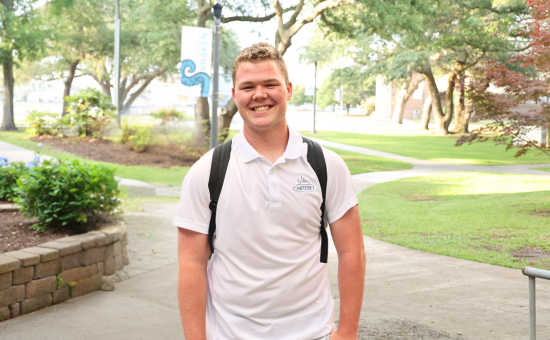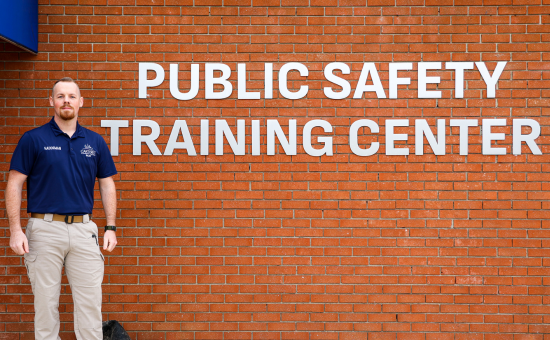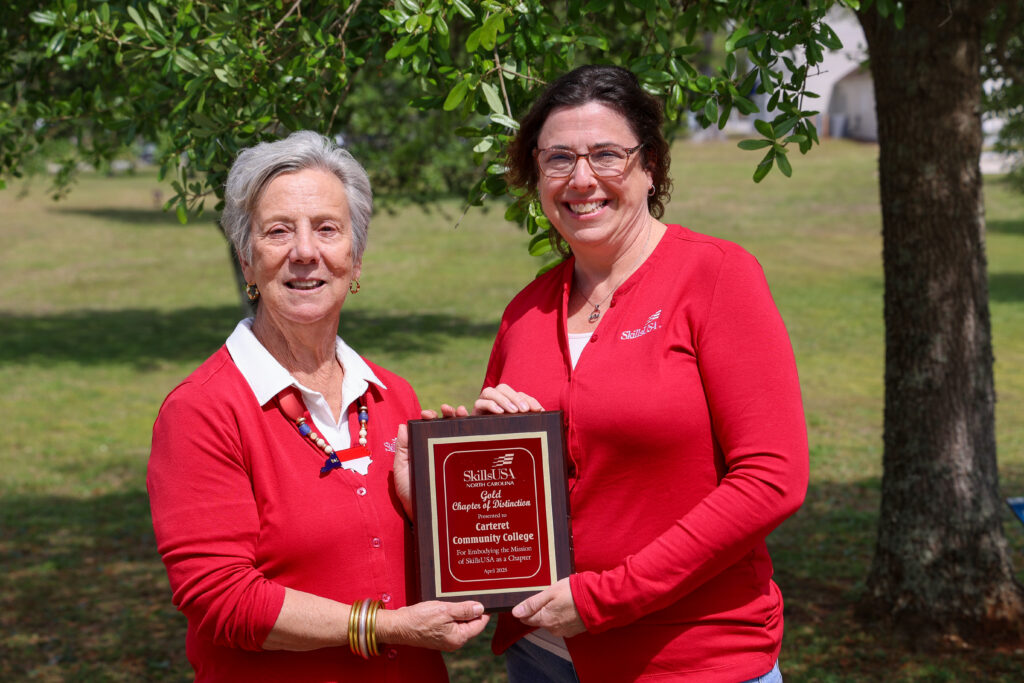
Medical Assisting
Program Overview
Start a rewarding career in healthcare with Carteret Community College’s Medical Assisting program. Designed to prepare multi-skilled professionals, this program equips you with the administrative, clinical, and laboratory competencies needed to thrive in today’s fast-paced medical environments.
Through hands-on instruction, you’ll learn to schedule appointments, manage billing and insurance, process patient records, and navigate essential computer operations. Clinical training includes assisting with examinations and treatments, performing routine lab procedures, conducting electrocardiography, and administering medications under supervision. You’ll also explore the ethical and legal responsibilities that come with providing quality patient care.
Graduates of our CAAHEP-accredited program may be eligible to sit for the American Association of Medical Assistants’ Certification Examination to become Certified Medical Assistants (CMA). Career opportunities are available in physicians’ offices, hospitals, health departments, and a wide range of outpatient and specialty practices.
Build the skills that make a difference — and begin your healthcare journey at Carteret Community College.
Information Sessions
Launch Your Healthcare Career with Carteret CC’s Medical Assisting Program!
Are you passionate about helping others and eager to embark on a rewarding career in healthcare? Carteret Community College’s Medical Assisting program is the perfect starting point for aspiring healthcare professionals. Our comprehensive program equips students with the essential skills and knowledge needed to excel in diverse medical settings.
Learn how to get started by scheduling an online or in-person information session.
Minimum Admission Requirements
Prerequisites
- Transcripts: Must be a high school graduate or equivalent and provide an official transcript. Send official transcripts from high school, GED and all colleges attended to the college Registrar. Home-schooled students must submit a copy of the home school’s approved registration from the state in which they are registered. Prior general education courses taken in college must be a grade of C or better. A student who earned a grade of less than a C in a general education course must retake the course and earn a minimum grade of a C.
- College Ready: College ready is demonstrated by the following:
- High School GPA > 2.8, or
- College coursework in English and math (ENG 111 or ENG 002 with a grade of P1 or equivalent; MAT 110 or MAT 003 grade of P1 or equivalent), or
- Minimum Placement test scores (RISE test or equivalent)
- English: Test out of TIER 1, and
- Math: Test out of TIER 1
Need more information about prerequisites? Email a Health Science Admissions Coordinator at [email protected].
Performance Standards
Medical Assistant duties involve cognitive, sensory, affective, and psychomotor performance requirements. Therefore, the following activities are examples of the kinds of activities that a student in the Medical Assisting program would be required to perform in order to successfully complete the program. The examples used are not all inclusive.
Critical thinking: The medical assisting student must possess critical thinking skills sufficient for clinical judgment. For example, the student must be able to use critical thinking as a basis for identifying/resolving patient problems.
Interpersonal skills: The medical assisting student should possess interpersonal skills sufficient to interact with individuals, families, and groups from a variety of social, emotional, cultural, and intellectual backgrounds. For example, the student should be able to establish a helping relationship with patients, families, and colleagues.
Communication: The medical assisting student must possess communication skills sufficient for interaction with others in verbal and written format. Communication abilities including speech, hearing, reading, writing, language skills and computer literacy are required. For example, the student must be able to read and convey actions and patient responses to health care team members, both verbally and in writing.
Mobility: The medical assisting student should possess physical skills sufficient to move from room to room and maneuver in small spaces. For example, the student must be able to move in patient rooms, work spaces, and treatment areas.
Motor skills: The medical assisting student should possess gross and fine motor skills sufficient to provide safe and effective care. For example, the student must be able to use equipment, administer injections, insert catheters, and other assigned duties under the supervision of the physician.
Hearing: The medical assisting student should possess auditory skills sufficient to monitor and observe health needs. For example, the student must be able to hear monitor alarms, emergency signals, and cries for help.
Visual: The medical assisting student should possess visual skills sufficient for observation of patient health changes. For example, the student must be able to observe patient responses, see a change in skin color, and read a scale on a syringe.
Tactile: The medical assisting student should possess tactile skills sufficient to assist physician in a physical assessment. For example, the student must be able to palpate a pulse.
Weight-bearing: The medical assisting student should possess the ability to lift and carry up to 25 pounds on a weekly or daily basis. For example, the student must be able to position and transfer patients.
Cognitive skills: The medical assisting student must possess the ability to organize responsibilities, make decisions, and make accurate mathematical calculations. For example, the student must be able to evaluate patient complaints.
Occupational exposure: The medical assisting student should possess the ability to protect self and others by implementing appropriate precautions due to possible exposure to communicable disease and/or body fluids, toxic substances, and medicinal preparations. For example, the student may encounter a patient with Hepatitis B or AIDS and must be able to use standard precautions. When a health problem occurs that results in multiple absences from class, lab, or clinical or injury impedes meeting the performance standards for a period of time, the medical assisting student is required to bring documentation from the physician or other healthcare provider noting the student can safely resume activities in the program. This documentation will be used to help determine if the student can return to class, lab, and/or clinical course requirements.
Program Outcomes
The Medical Assisting Diploma Program at Carteret Community College (Morehead City, NC) 5-year cumulative average job placement rate is 91.30% for 2019 – 2023.
Job Placement 5-Year Average
- Threshold > 60%
- Carteret CC = 91.30%
Source: 2024 Annual Report
The Medical Assisting Diploma Program at Carteret Community College (Morehead City, NC) 5-year cumulative average retention rate is 93.62% for 2019 – 2023.
Retention Rate 5-Year Average
- Threshold > 60%
- Carteret CC = 93.62%
Program Accreditation
The Medical Assisting Program is accredited by:

Commission on Accreditation of Allied Health Education Programs
25400 US Highway 19 North, Suite 158
Clearwater, FL 33763
Phone: 727-210-2350
Website: www.caahep.org
Carteret Community College Medical Assisting Program is accredited the by the Commission on Accreditation of Allied Health Education Programs (CAAHEP) on recommendation of the Medical Assisting Education Review Board (MAERB). Upon successful completion of the Medical Assisting program, the graduate is eligible to sit for national certification through the American Association of Medical Assistants to become a Certified Medical Assistant CMA (AAMA). Employment opportunities include physicians’ offices, health maintenance organizations, health departments, and hospitals.
The Medical Assisting program begins once a year with the fall semester. Potential applicants should follow the admission requirements and specific deadlines available through the Student Enrollment Resource office.
The Carteret Community College Medical Assisting Diploma program is accredited by the Commission on Accreditation of Allied Health Education Programs (www.caahep.org) upon recommendation of Medical Assisting Education Review Board (MAERB). Graduates of accredited programs are eligible to take the American Association of Medical Assistants (AAMA) certification exam.
Transfer Opportunities
Looking to transfer to a university after you complete your Medical Assisting pathway at Carteret CC? Explore your options.
Diploma - Medical Assisting
Diploma programs are designed to provide focused, entry-level training that can typically be completed in about one (1) year. These programs may stand alone or be structured within an Associate in Applied Science (AAS) degree pathway. This allows students to enter the workforce quickly or continue their studies by completing additional coursework to earn a full AAS degree.
Course Sequence
Fall Semester
Spring Semester
Summer Semester
| Course Code | Title | Credits |
|---|---|---|
| MED-260 | MED Clinical Practicum | 5 |
| MED-264 | Medical Assisting Overview | 2 |
| PSY-150 or PSY-118 | General Psychology or Interpersonal Psychology | 3 |
| Sub-Total Credits | 10 | |
Total Credits: 48 credits
Certificate - Medical Assisting
Certificate programs are short-term training options that can typically be completed in one (1) year or less. They are designed to prepare you for employment, upgrade your skills, or provide retraining—helping you quickly gain the knowledge and hands-on experience needed to advance in the workforce.
Course Sequence
Fall Semester
| Course Code | Title | Credits |
|---|---|---|
| MED-110 | Orientation to Medical Assisting | 1 |
| MED-121 | Medical Terminology I | 3 |
| MED-130 | Administrative Office Procedures I | 2 |
| OST-149 | Medical Legal Issues | 3 |
| Sub-Total Credits | 9 | |
Spring Semester
| Course Code | Title | Credits |
|---|---|---|
| MED-122 | Medical Terminology II | 3 |
| MED-131 | Administrative Office Procedures II | 2 |
| Sub-Total Credits | 5 | |
Total Credits: 14 credits
Pathway - Medical Assisting(CCP)
Career & College Promise (CCP) offers high school students the opportunity to take tuition-free college courses that count toward both high school and college graduation requirements. In about two years or less, students can complete college credits, certificates, or other credentials—giving them a valuable head start on their education and career goals. By enrolling in CCP, students save time, save money, and gain the confidence of knowing they are already on the path to success in college and beyond.
Course Sequence
Fall Semester
| Course Code | Title | Credits |
|---|---|---|
| MED-110 | Orientation to Medical Assisting | 1 |
| MED-121 | Medical Terminology I | 3 |
| MED-130 | Administrative Office Procedures I | 2 |
| OST-149 | Medical Legal Issues | 3 |
| Sub-Total Credits | 9 | |
Spring Semester
| Course Code | Title | Credits |
|---|---|---|
| MED-122 | Medical Terminology II | 3 |
| MED-131 | Administrative Office Procedures II | 2 |
| Sub-Total Credits | 5 | |
Total Credits: 14 credits
WCE Available Classes
Boost your skills, explore new careers, or stay current in your field with Carteret CC’s Workforce Continuing Education. Our flexible, non-credit courses—offered online or in-person—range from a few hours to several hundred hours and cover everything from technical training to professional development and personal enrichment. Affordable and practical, these courses help you grow your career and reach your goals on your schedule.
Program Overview
Start a rewarding career in healthcare with Carteret Community College’s Medical Assisting program. Designed to prepare multi-skilled professionals, this program equips you with the administrative, clinical, and laboratory competencies needed to thrive in today’s fast-paced medical environments.
Through hands-on instruction, you’ll learn to schedule appointments, manage billing and insurance, process patient records, and navigate essential computer operations. Clinical training includes assisting with examinations and treatments, performing routine lab procedures, conducting electrocardiography, and administering medications under supervision. You’ll also explore the ethical and legal responsibilities that come with providing quality patient care.
Graduates of our CAAHEP-accredited program may be eligible to sit for the American Association of Medical Assistants’ Certification Examination to become Certified Medical Assistants (CMA). Career opportunities are available in physicians’ offices, hospitals, health departments, and a wide range of outpatient and specialty practices.
Build the skills that make a difference — and begin your healthcare journey at Carteret Community College.
Information Sessions
Launch Your Healthcare Career with Carteret CC’s Medical Assisting Program!
Are you passionate about helping others and eager to embark on a rewarding career in healthcare? Carteret Community College’s Medical Assisting program is the perfect starting point for aspiring healthcare professionals. Our comprehensive program equips students with the essential skills and knowledge needed to excel in diverse medical settings.
Learn how to get started by scheduling an online or in-person information session.
Minimum Admission Requirements
Prerequisites
- Transcripts: Must be a high school graduate or equivalent and provide an official transcript. Send official transcripts from high school, GED and all colleges attended to the college Registrar. Home-schooled students must submit a copy of the home school’s approved registration from the state in which they are registered. Prior general education courses taken in college must be a grade of C or better. A student who earned a grade of less than a C in a general education course must retake the course and earn a minimum grade of a C.
- College Ready: College ready is demonstrated by the following:
- High School GPA > 2.8, or
- College coursework in English and math (ENG 111 or ENG 002 with a grade of P1 or equivalent; MAT 110 or MAT 003 grade of P1 or equivalent), or
- Minimum Placement test scores (RISE test or equivalent)
- English: Test out of TIER 1, and
- Math: Test out of TIER 1
Need more information about prerequisites? Email a Health Science Admissions Coordinator at [email protected].
Performance Standards
Medical Assistant duties involve cognitive, sensory, affective, and psychomotor performance requirements. Therefore, the following activities are examples of the kinds of activities that a student in the Medical Assisting program would be required to perform in order to successfully complete the program. The examples used are not all inclusive.
Critical thinking: The medical assisting student must possess critical thinking skills sufficient for clinical judgment. For example, the student must be able to use critical thinking as a basis for identifying/resolving patient problems.
Interpersonal skills: The medical assisting student should possess interpersonal skills sufficient to interact with individuals, families, and groups from a variety of social, emotional, cultural, and intellectual backgrounds. For example, the student should be able to establish a helping relationship with patients, families, and colleagues.
Communication: The medical assisting student must possess communication skills sufficient for interaction with others in verbal and written format. Communication abilities including speech, hearing, reading, writing, language skills and computer literacy are required. For example, the student must be able to read and convey actions and patient responses to health care team members, both verbally and in writing.
Mobility: The medical assisting student should possess physical skills sufficient to move from room to room and maneuver in small spaces. For example, the student must be able to move in patient rooms, work spaces, and treatment areas.
Motor skills: The medical assisting student should possess gross and fine motor skills sufficient to provide safe and effective care. For example, the student must be able to use equipment, administer injections, insert catheters, and other assigned duties under the supervision of the physician.
Hearing: The medical assisting student should possess auditory skills sufficient to monitor and observe health needs. For example, the student must be able to hear monitor alarms, emergency signals, and cries for help.
Visual: The medical assisting student should possess visual skills sufficient for observation of patient health changes. For example, the student must be able to observe patient responses, see a change in skin color, and read a scale on a syringe.
Tactile: The medical assisting student should possess tactile skills sufficient to assist physician in a physical assessment. For example, the student must be able to palpate a pulse.
Weight-bearing: The medical assisting student should possess the ability to lift and carry up to 25 pounds on a weekly or daily basis. For example, the student must be able to position and transfer patients.
Cognitive skills: The medical assisting student must possess the ability to organize responsibilities, make decisions, and make accurate mathematical calculations. For example, the student must be able to evaluate patient complaints.
Occupational exposure: The medical assisting student should possess the ability to protect self and others by implementing appropriate precautions due to possible exposure to communicable disease and/or body fluids, toxic substances, and medicinal preparations. For example, the student may encounter a patient with Hepatitis B or AIDS and must be able to use standard precautions. When a health problem occurs that results in multiple absences from class, lab, or clinical or injury impedes meeting the performance standards for a period of time, the medical assisting student is required to bring documentation from the physician or other healthcare provider noting the student can safely resume activities in the program. This documentation will be used to help determine if the student can return to class, lab, and/or clinical course requirements.
Program Outcomes
The Medical Assisting Diploma Program at Carteret Community College (Morehead City, NC) 5-year cumulative average job placement rate is 91.30% for 2019 – 2023.
Job Placement 5-Year Average
- Threshold > 60%
- Carteret CC = 91.30%
Source: 2024 Annual Report
The Medical Assisting Diploma Program at Carteret Community College (Morehead City, NC) 5-year cumulative average retention rate is 93.62% for 2019 – 2023.
Retention Rate 5-Year Average
- Threshold > 60%
- Carteret CC = 93.62%
Program Accreditation
The Medical Assisting Program is accredited by:

Commission on Accreditation of Allied Health Education Programs
25400 US Highway 19 North, Suite 158
Clearwater, FL 33763
Phone: 727-210-2350
Website: www.caahep.org
Carteret Community College Medical Assisting Program is accredited the by the Commission on Accreditation of Allied Health Education Programs (CAAHEP) on recommendation of the Medical Assisting Education Review Board (MAERB). Upon successful completion of the Medical Assisting program, the graduate is eligible to sit for national certification through the American Association of Medical Assistants to become a Certified Medical Assistant CMA (AAMA). Employment opportunities include physicians’ offices, health maintenance organizations, health departments, and hospitals.
The Medical Assisting program begins once a year with the fall semester. Potential applicants should follow the admission requirements and specific deadlines available through the Student Enrollment Resource office.
The Carteret Community College Medical Assisting Diploma program is accredited by the Commission on Accreditation of Allied Health Education Programs (www.caahep.org) upon recommendation of Medical Assisting Education Review Board (MAERB). Graduates of accredited programs are eligible to take the American Association of Medical Assistants (AAMA) certification exam.
Transfer Opportunities
Looking to transfer to a university after you complete your Medical Assisting pathway at Carteret CC? Explore your options.
Diploma - Medical Assisting
Stay on track towards graduation.
Course Sequence
Fall Semester
Spring Semester
Summer Semester
| Course Code | Title | Credits |
|---|---|---|
| MED-260 | MED Clinical Practicum | 5 |
| MED-264 | Medical Assisting Overview | 2 |
| PSY-150 or PSY-118 | General Psychology or Interpersonal Psychology | 3 |
| Sub-Total Credits | 10 | |
Total Credits: 48 credits
Certificate - Medical Assisting
Stay on track towards graduation.
Course Sequence
Fall Semester
| Course Code | Title | Credits |
|---|---|---|
| MED-110 | Orientation to Medical Assisting | 1 |
| MED-121 | Medical Terminology I | 3 |
| MED-130 | Administrative Office Procedures I | 2 |
| OST-149 | Medical Legal Issues | 3 |
| Sub-Total Credits | 9 | |
Spring Semester
| Course Code | Title | Credits |
|---|---|---|
| MED-122 | Medical Terminology II | 3 |
| MED-131 | Administrative Office Procedures II | 2 |
| Sub-Total Credits | 5 | |
Total Credits: 14 credits
Pathway - Medical Assisting (CCP)
Take tuition-free college courses that count toward both high school and college graduation requirements.
Course Sequence
Fall Semester
| Course Code | Title | Credits |
|---|---|---|
| MED-110 | Orientation to Medical Assisting | 1 |
| MED-121 | Medical Terminology I | 3 |
| MED-130 | Administrative Office Procedures I | 2 |
| OST-149 | Medical Legal Issues | 3 |
| Sub-Total Credits | 9 | |
Spring Semester
| Course Code | Title | Credits |
|---|---|---|
| MED-122 | Medical Terminology II | 3 |
| MED-131 | Administrative Office Procedures II | 2 |
| Sub-Total Credits | 5 | |
Total Credits: 14 credits
WCE Available Classes
Steps to Apply
Step 1: Determine State Residency
If you live in North Carolina, you can save money on in-state college admission expenses. The Residency Determination Service (RDS) helps establish your status so you can apply to public colleges and universities and state aid programs.
Step 2: Complete Your Application
Take the first step in your Carteret CC journey by filling out an application. It's available on the College Foundation of North Carolina (CFNC) website - log in with the username and password you used for RDS.
Step 3: Submit Official Transcripts
You’re almost there! Now, we just need your official transcript(s). Contact all schools you have attended and request they send your official high school, GED, high school equivalency, and/or college transcripts to [email protected].
Step 4: Submit Health Sciences Application
Students must complete Steps 1-3 above, as well as meet all of the program's minimum admissions requirements before submitting the Selective Health Sciences Application. Applications submitted after the closing date will be consider for the next admission cycle.
Step 5: Apply for Financial Aid
Most students and families are eligible for some type of financial aid – from grants, scholarships, loans, or work-study. The first step is to complete the Free Application for Federal Student Aid.
Learn more about these funds you on our Paying for College webpage.
Helpful hints – Remember to use college code 008081 when submitting your FAFSA. Contact the Financial Aid Office at (252) 222-6293 for questions.
Step 6: Register for Classes
Once you've been admitted, you'll meet with an academic advisor to plan and register for class.
Step 1: Determine State Residency
If you live in North Carolina, you can save money on in-state college admission expenses. The Residency Determination Service (RDS) helps establish your status so you can apply to public colleges and universities and state aid programs.
Step 2: Complete Your Application
Take the first step in your Carteret CC journey by filling out an application. It's available on the College Foundation of North Carolina (CFNC) website - log in with the username and password you used for RDS.
Step 3: Submit Official Transcripts
You’re almost there! Now, we just need your official transcript(s). Contact all schools you have attended and request they send your official high school, GED, high school equivalency, and/or college transcripts to [email protected].
Step 4: Submit Health Sciences Application
Students must complete Steps 1-3 above, as well as meet all of the program's minimum admissions requirements before submitting the Selective Health Sciences Application. Applications submitted after the closing date will be consider for the next admission cycle.
Step 5: Apply for Financial Aid
Most students and families are eligible for some type of financial aid – from grants, scholarships, loans, or work-study. The first step is to complete the Free Application for Federal Student Aid.
Learn more about these funds you on our Paying for College webpage.
Helpful hints – Remember to use college code 008081 when submitting your FAFSA. Contact the Financial Aid Office at (252) 222-6293 for questions.
Step 6: Register For Classes
Once you've been admitted, you'll meet with an academic advisor to plan and register for class.




